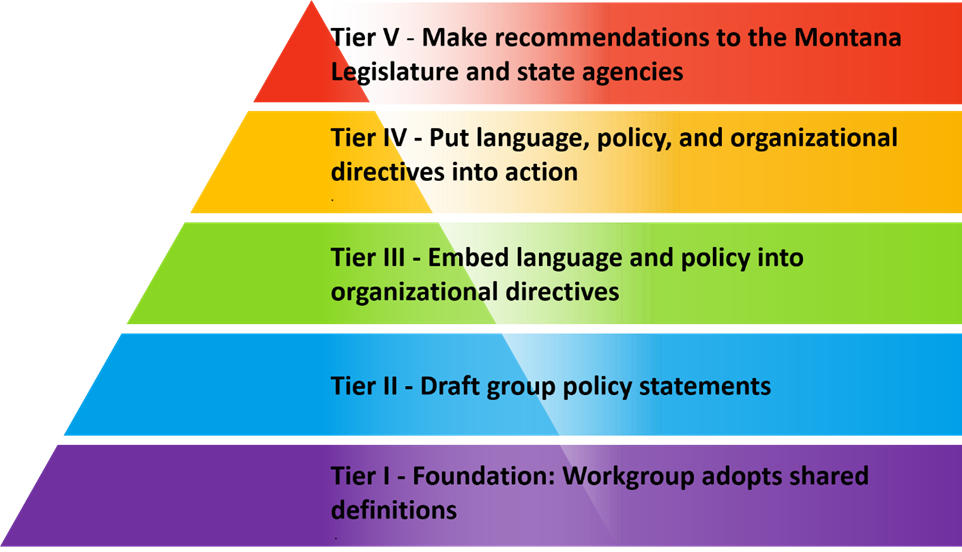Linking Systems of Care Montana, Trauma-Informed Approaches, Module 1
Jess Mayrer, MPA Program coordinator | Vision 21: Linking Systems of Care for Children and Youth in Montana Social Science Research Laboratory University of Montana
Module One provides background information regarding the development of the seven key principles that drive the Linking Systems of Care Montana Trauma-Informed Approaches training.
Linking Systems of Care Montana, Trauma-Informed Approaches, Module 2
Lisa Conradi, Psy.D. | Director of Clinical Operations and Interim Executive Chadwick Center for Children and Families Rady Children’s Hospital - San Diego
Module Two focuses on physical and emotional safety and how these core principles align with a trauma-informed care approach. The module also includes discussions on practical solutions to increase physical and emotional safety.
Linking Systems of Care Montana, Trauma-Informed Approaches, Module 3
Darren Mitchell, JD | Independent Consultant for the National Council of Juvenile and Family Court Judges
Module Three focuses on the intertwined concepts of 1) building trust with victims and their families and 2) establishing transparency both within organizations and with those with whom we work. The module also includes strategies that can be implemented to increase trust and transparency.
Linking Systems of Care Montana, Trauma-Informed Approaches, Module 4
Jess Mayrer, MPA | Program coordinator Vision 21: Linking Systems of Care for Children and Youth in Montana Social Science Research Laboratory University of Montana
Module Four discusses specific types of peer support programs. The module also identifies important elements of effective peer support. Participants will learn strategies that can be used to facilitate increased peer support among clients and staff. Note: Module Four is primarily focused on peer support in the state of Montana.
Linking Systems of Care Montana, Trauma-Informed Approaches, Module 5
Wendy Loader Schiller, MPM | Senior Program Manager National Council of Juvenile and Family Court Judges
Module 5 covers the goals and definitions of organizational collaboration and mutuality in two distinct ways: 1) bringing in collaboration & mutuality with families and youth in service delivery & treatment plans; and 2) increasing collaboration and mutuality between frontline staff and administrators to improve team cohesion and development of skills, through ongoing continuous quality improvement.
Linking Systems of Care Montana, Trauma-Informed Approaches, Module 6
Jane Halladay Goldman, PhD & Jess Mayrer, MPA
Module Six discusses the impact on individuals and how organizations, programs, and agencies can effectively respond to trauma and resist re-traumatization. Specifically, practices that enhance empowerment, voice, and choice for clients (patients, consumers, etc.), their families, and for providers (staff) at an organization, agency, or program will be explored.
Linking Systems of Care Montana, Trauma-Informed Approaches, Module 7
Adrea Korthase, JD | Senior Program Manager National Council of Juvenile and Family Court Judges
Module Seven discusses how agencies and organizations can better understand the historical trauma and historical resiliency that shows up in high-risk populations including indigenous communities. The module also discusses developing an environment where all staff encourage inclusivity.
Linking Systems of Care Montana, Trauma-Informed Approaches, Module 8
Judge Kim McGinnis | Chief Judge Pueblo of Pojoaque Tribal Court
Module Eight discusses strategies to garner leadership support for trauma- informed care. The module also includes an overview of human resource policies, reflective supervision strategies, and other evidence-based services that serve as crucial scaffolding of trauma-informed care.
Background and Development
This training curriculum was developed under the Linking Systems of Care for Children and Youth in Montana (LSOC Montana) project. LSOC Montana was a six-year demonstration project funded by the Office for Victims of Crime. The project was designed to promote healing for young crime victims and their families by developing and coordinating trauma-informed prevention and intervention services. Four states—Illinois, Montana, Ohio, and Virginia—were selected in a competitive process to participate in planning and implementing reforms. In Montana, project partners included the Montana Board of Crime Control, the University of Montana Criminology Research Group, and stakeholders from across the state.
The larger LSOC project was guided by a set of core values – the Linking Systems of Care for Children and Youth Guiding Principles:
- Healing Individuals, Families, and Communities
- Linked Systems of Care
- Informed Decision Making
To help further these guiding principles and to make the state of Montana more trauma-informed, LSOC Montana convened the Montana Policy Workgroup. Comprised of “trauma-informed care champions,” group members included judicial actors; state administrators from the Child and Family Services Division, the Office of Public Instruction, and Youth Court Services; clergy; front-line service providers; academics; and others.
The Montana Policy Workgroup developed a framework to guide the state toward a trauma-informed paradigm shift. Each tier, highlighted here in the rainbow pyramid, guided the process of adopting shared definitions, drafting policy statements, embedding language and policy into organizational directives, putting that language into action, and, finally, making recommendations to the Montana legislature and state agencies. In every tier, the work was guided by evidence-based research on trauma-informed approaches.
The Montana Policy Workgroup’s trauma-informed policy-and-practice template formed the basis for this curriculum.
